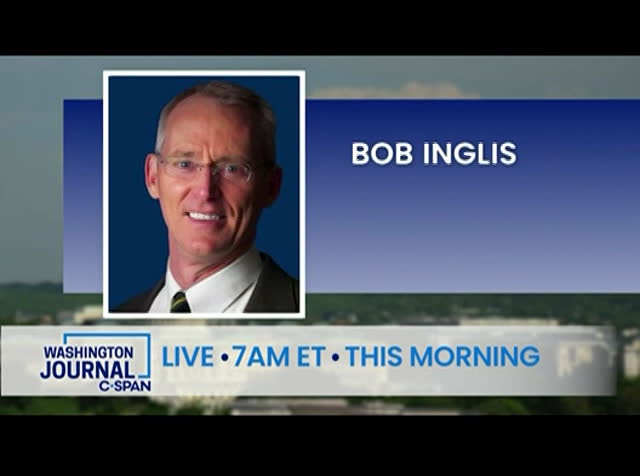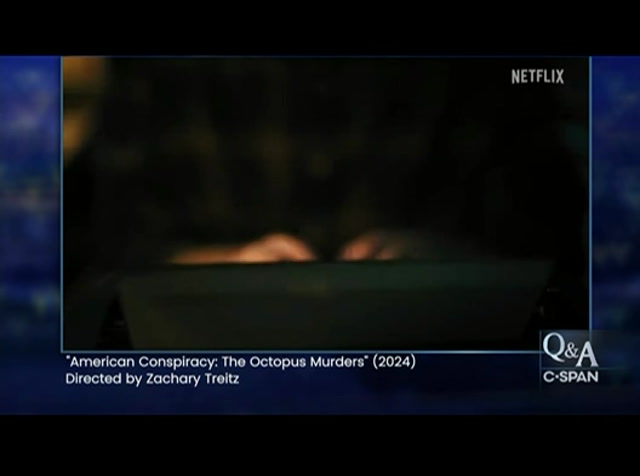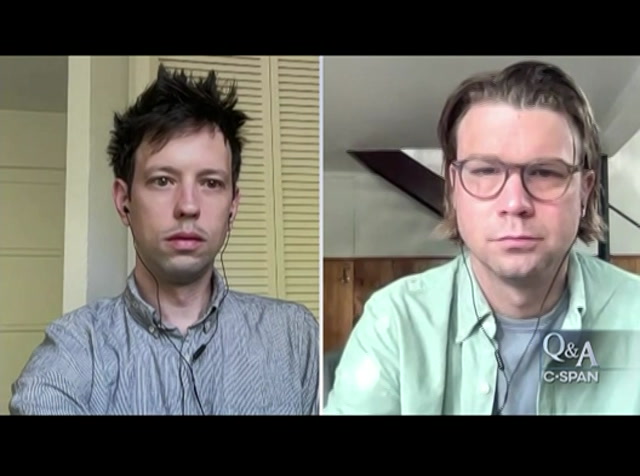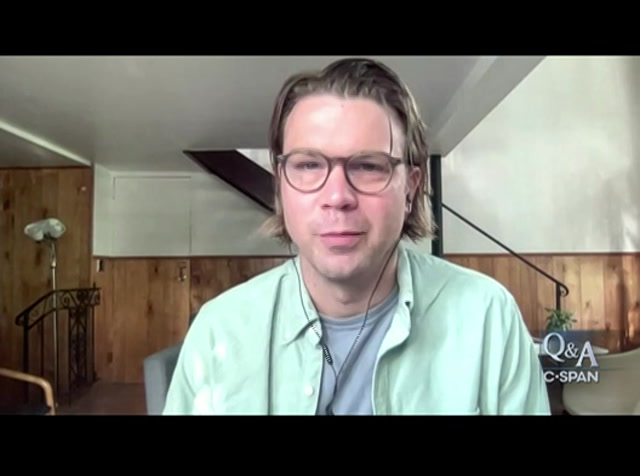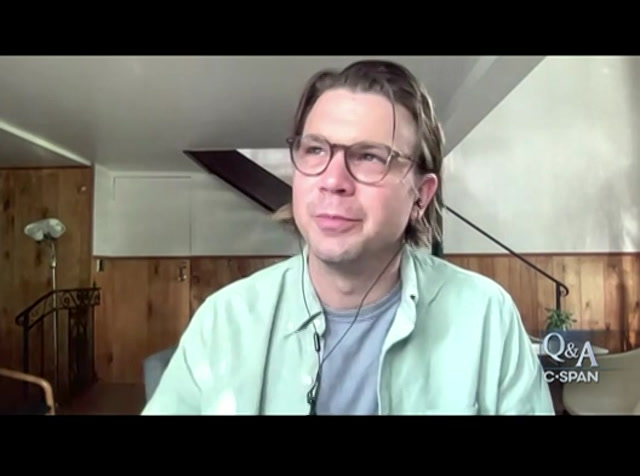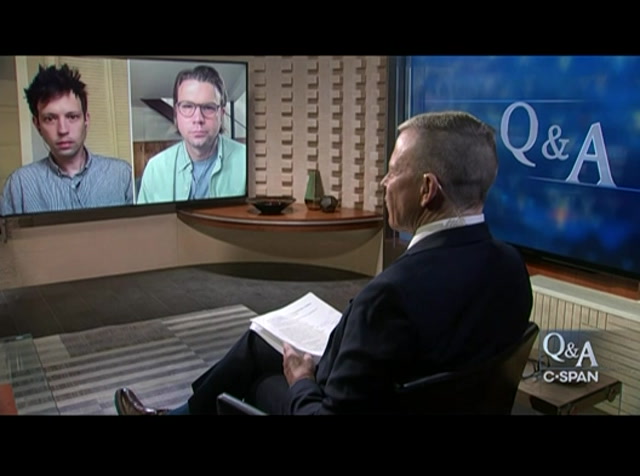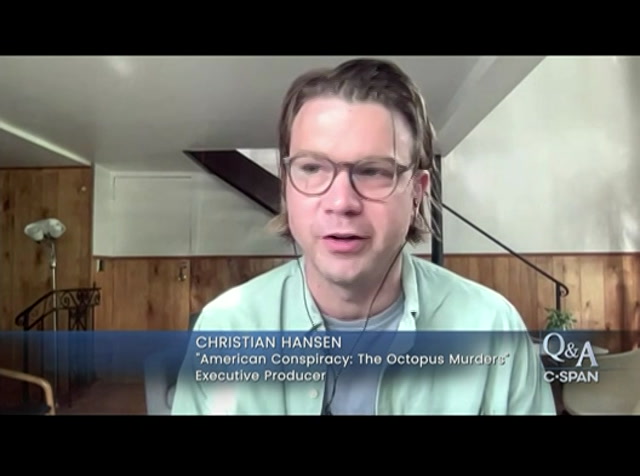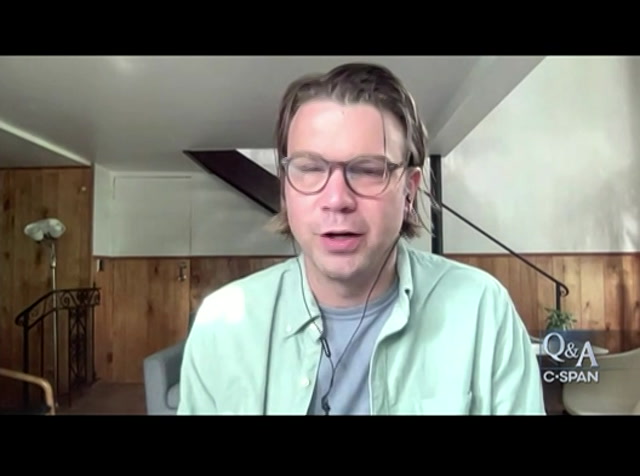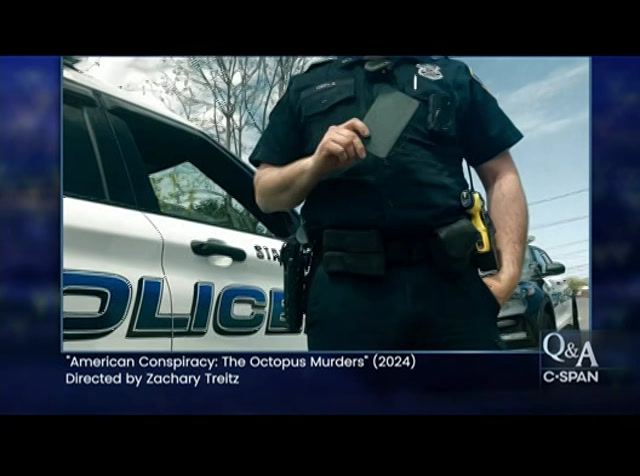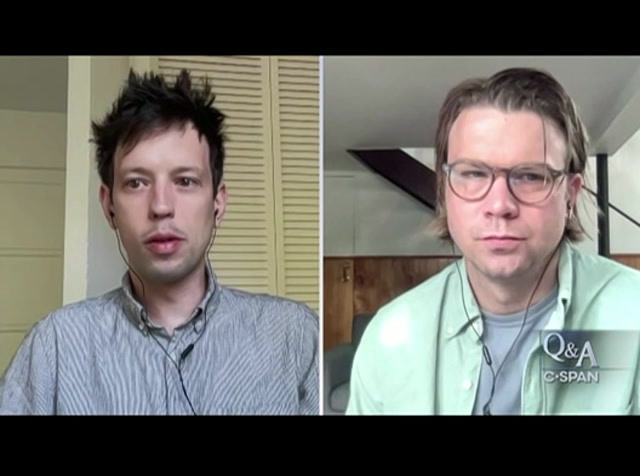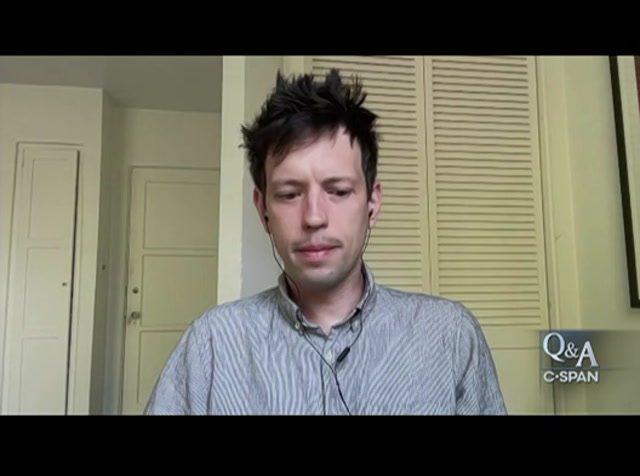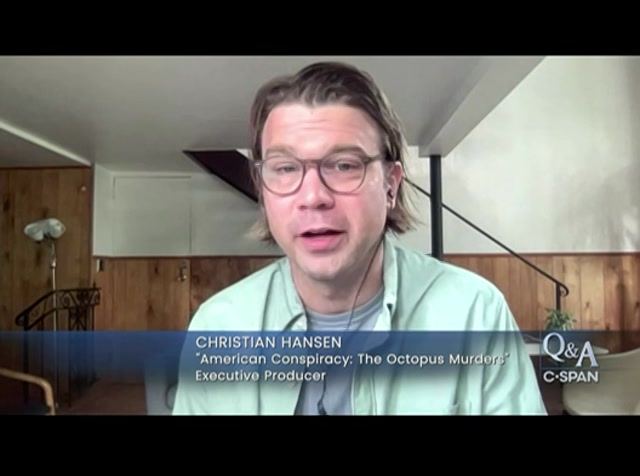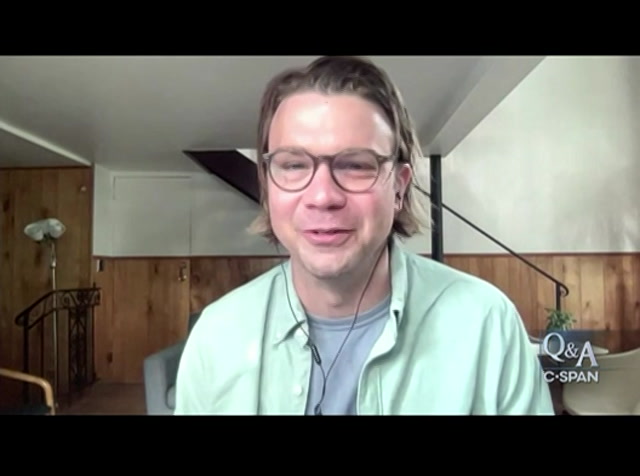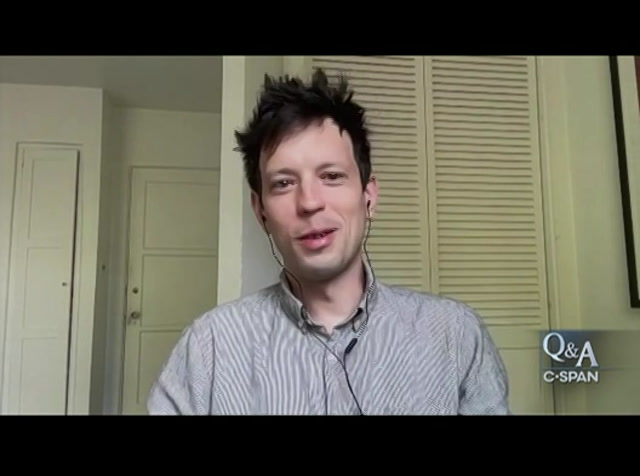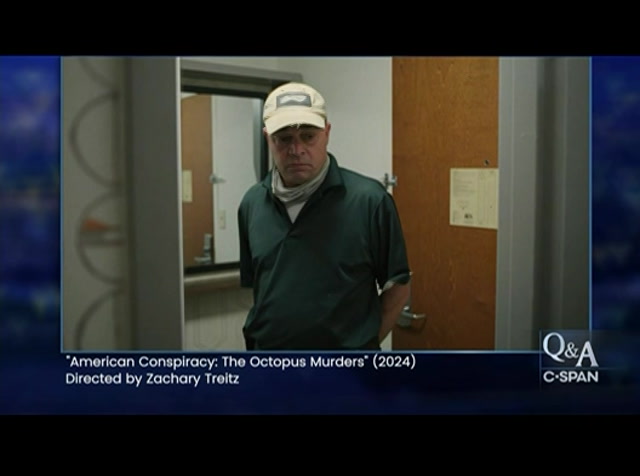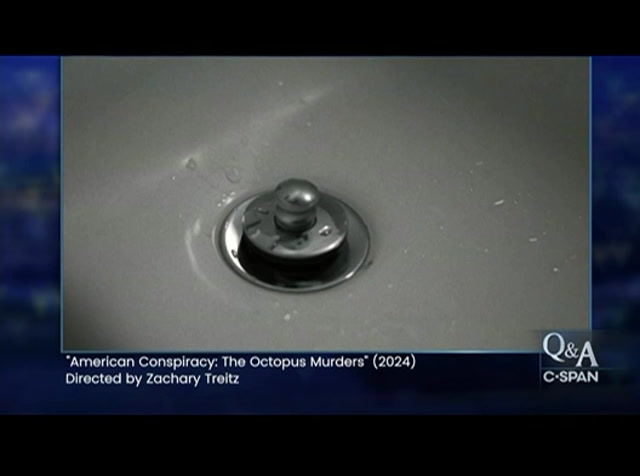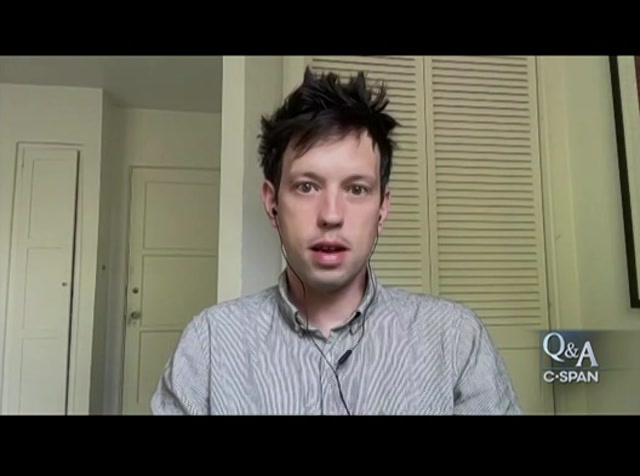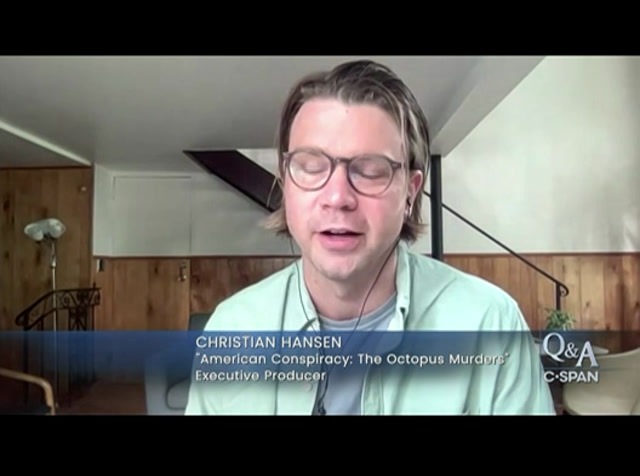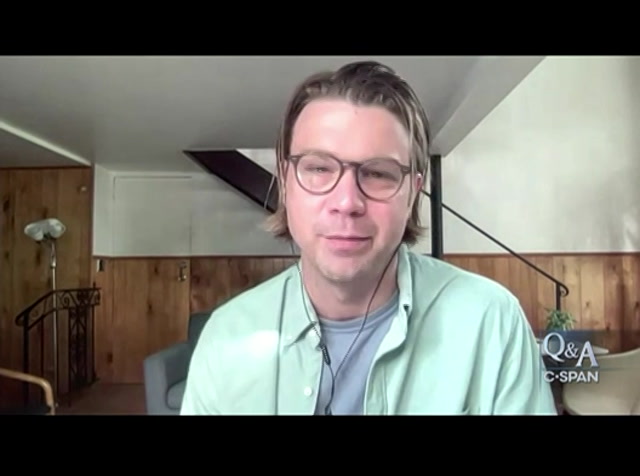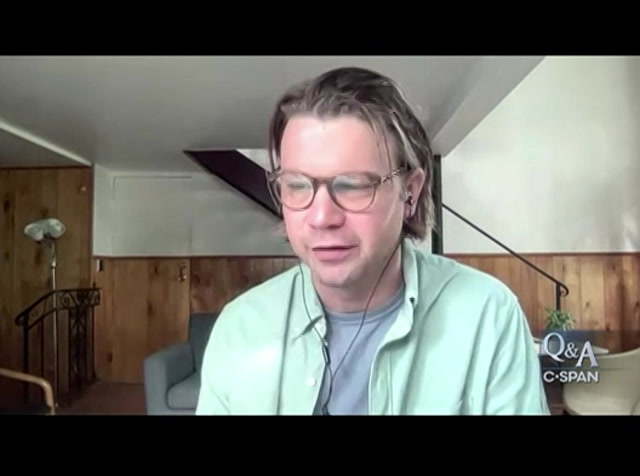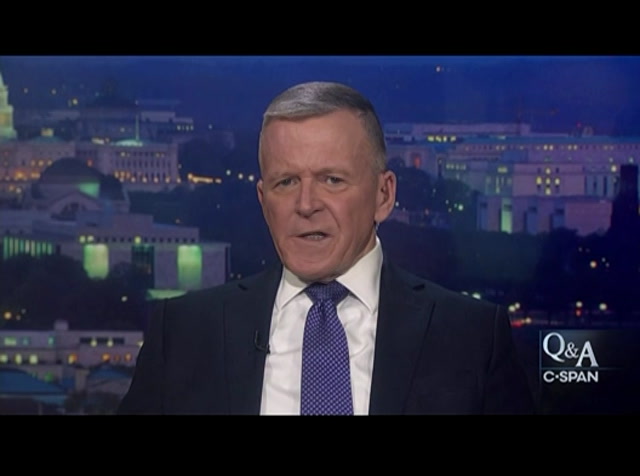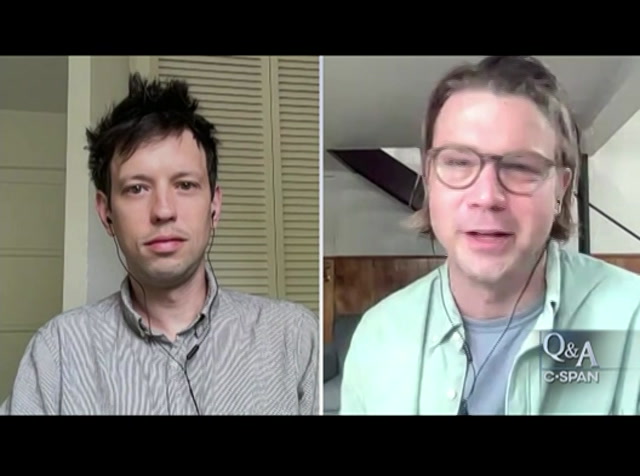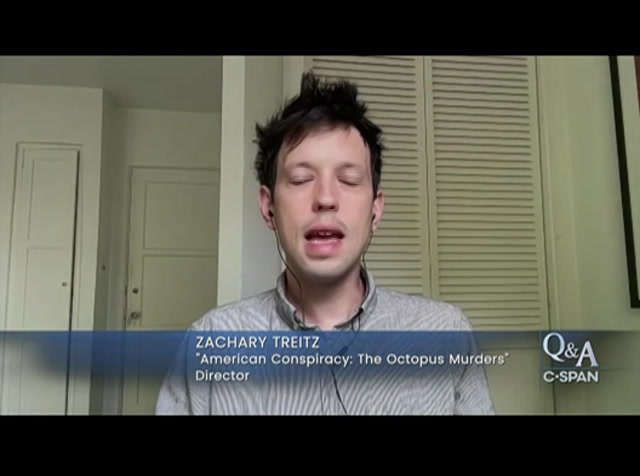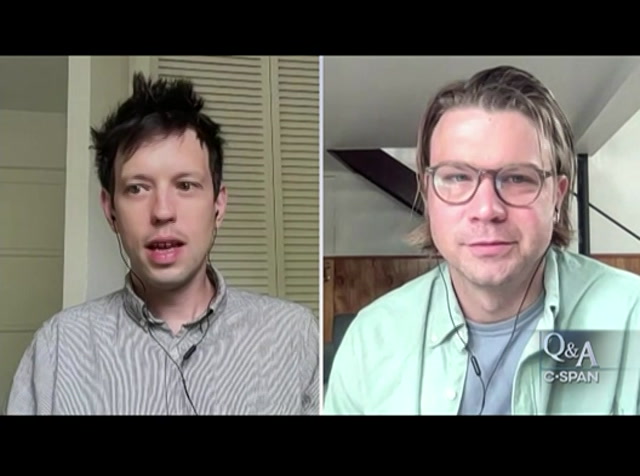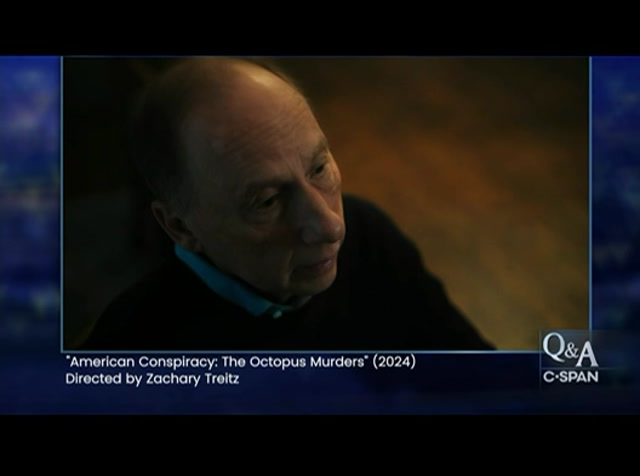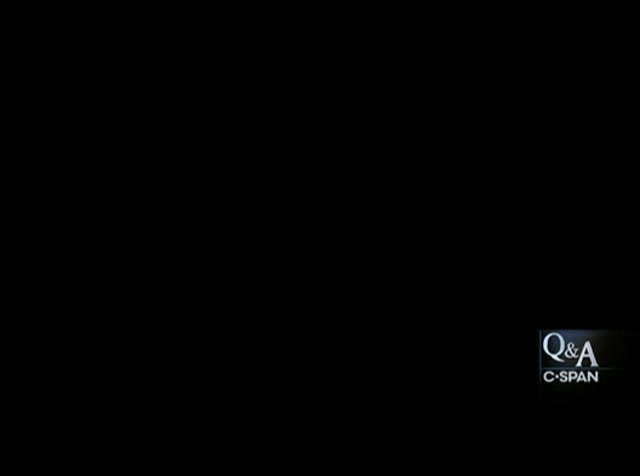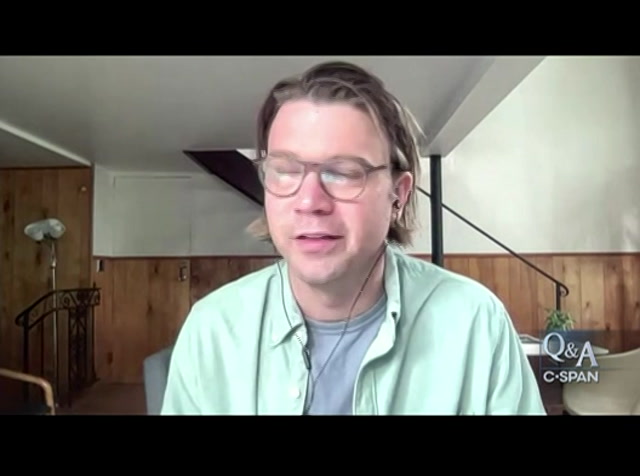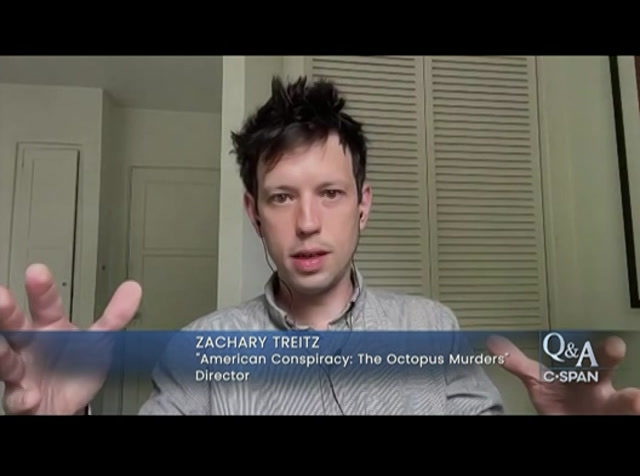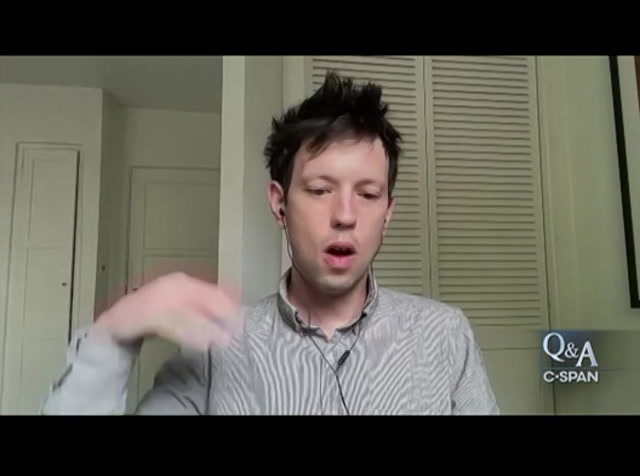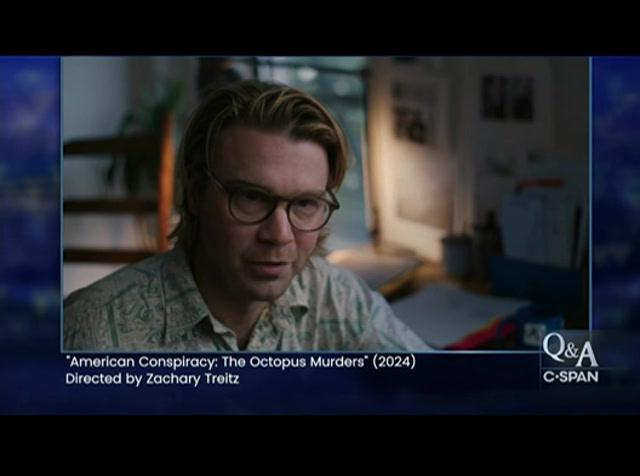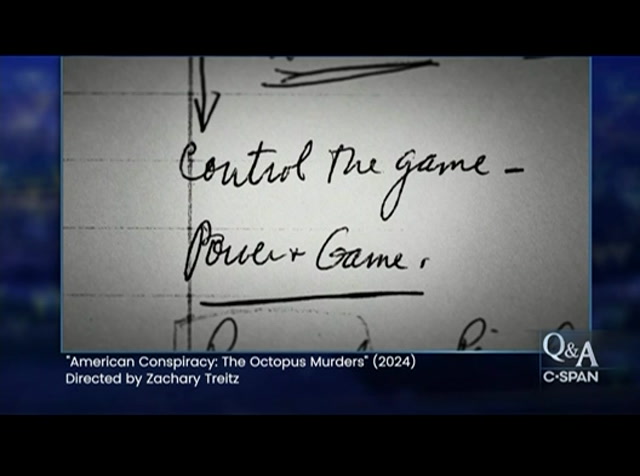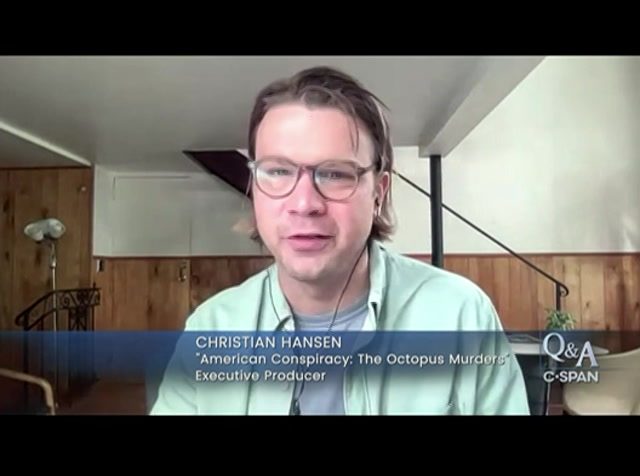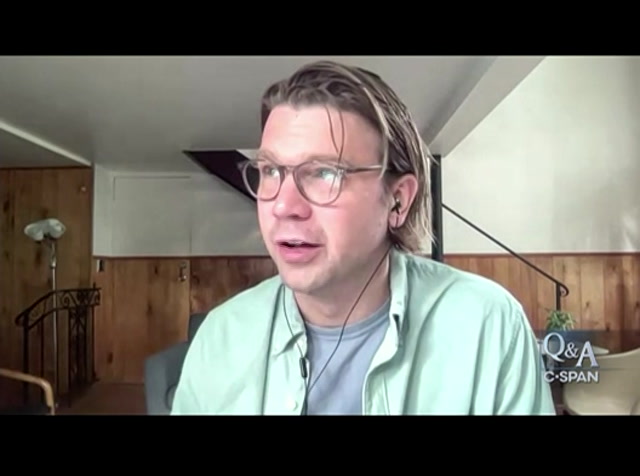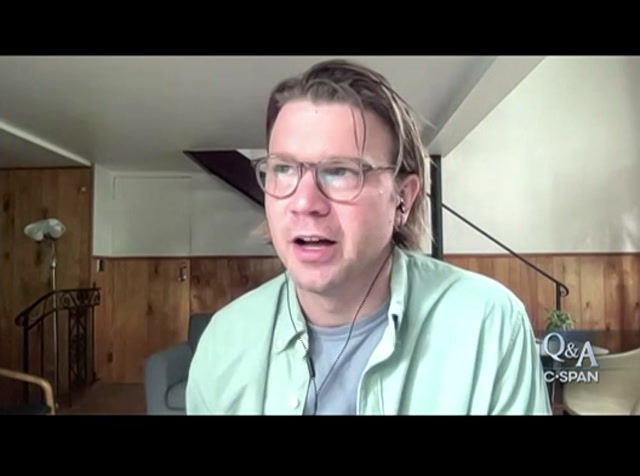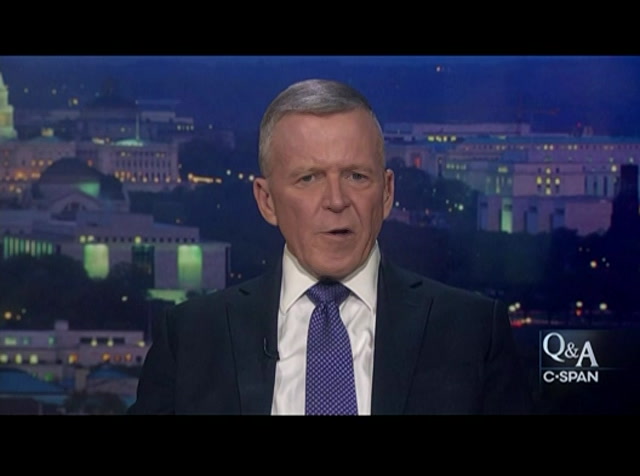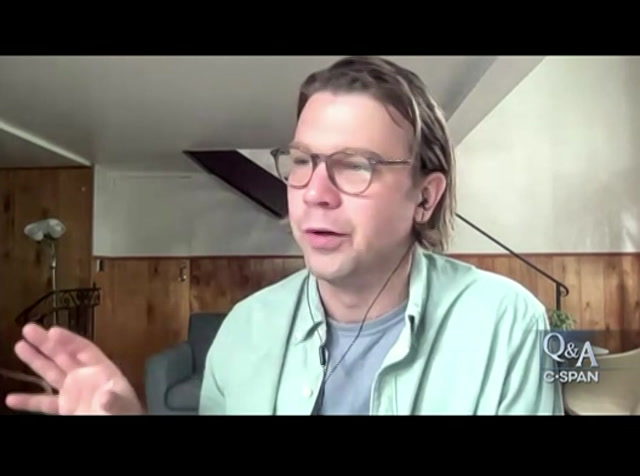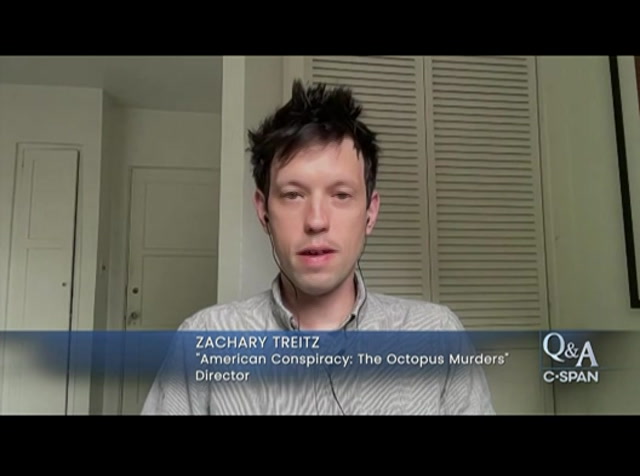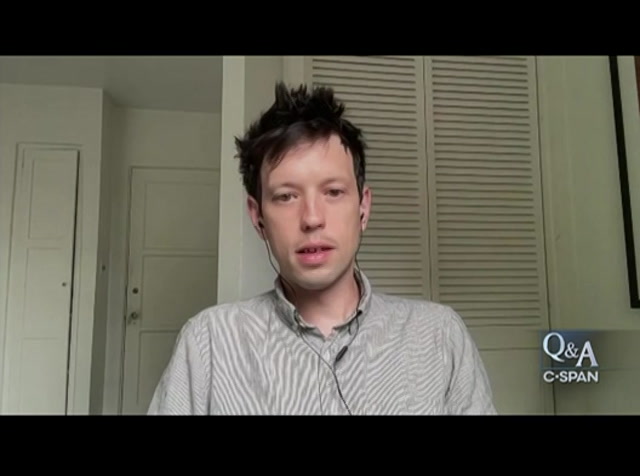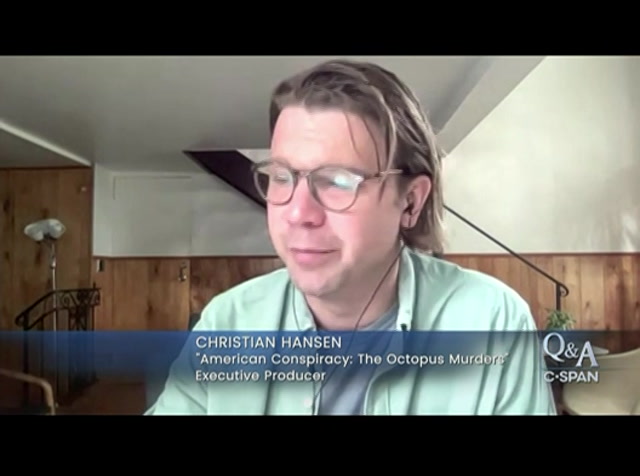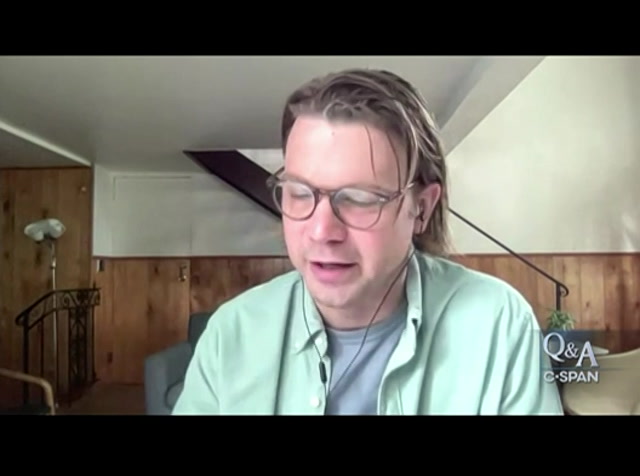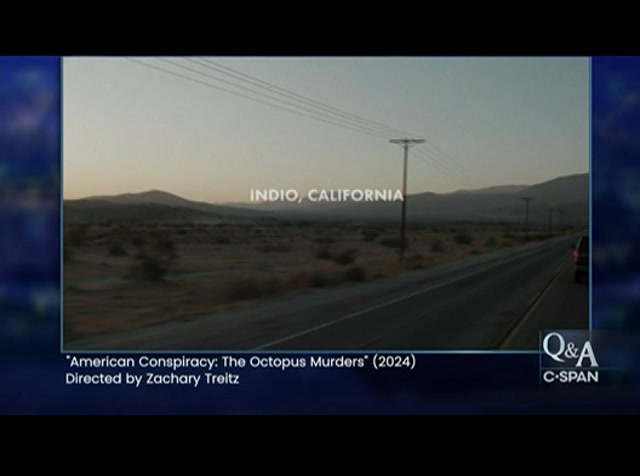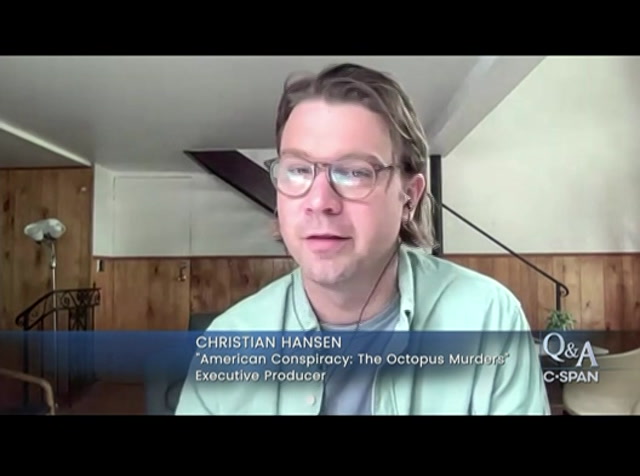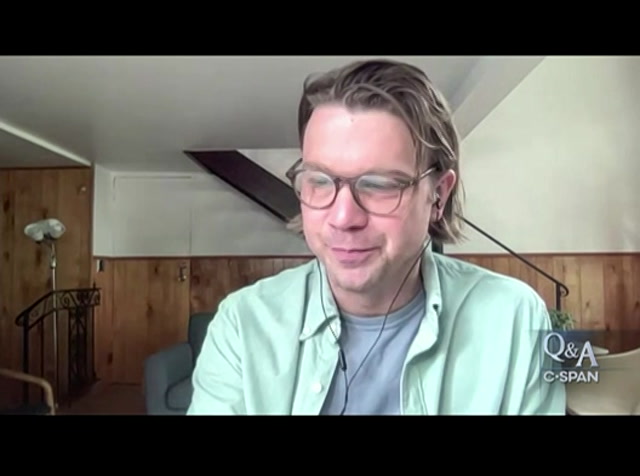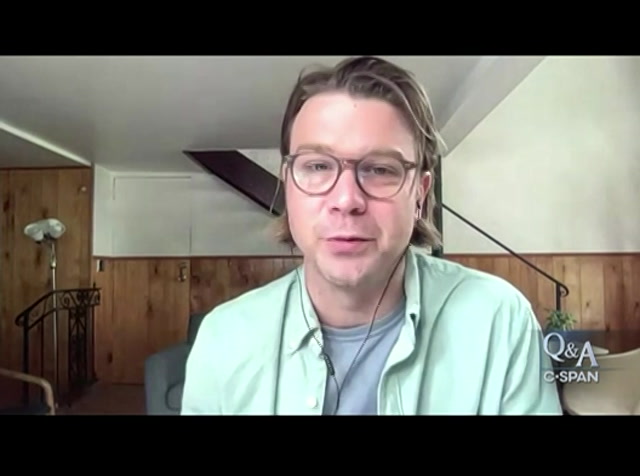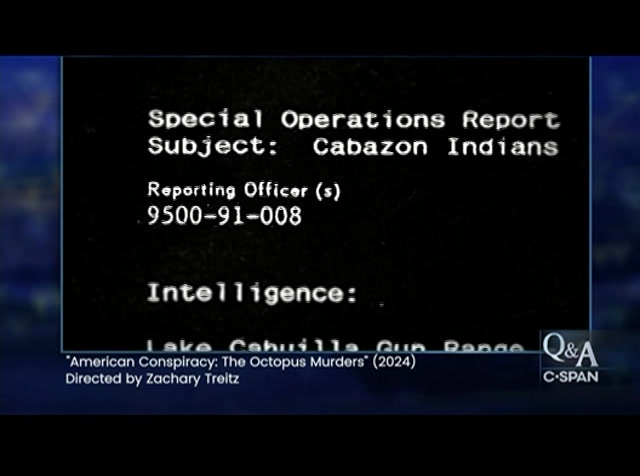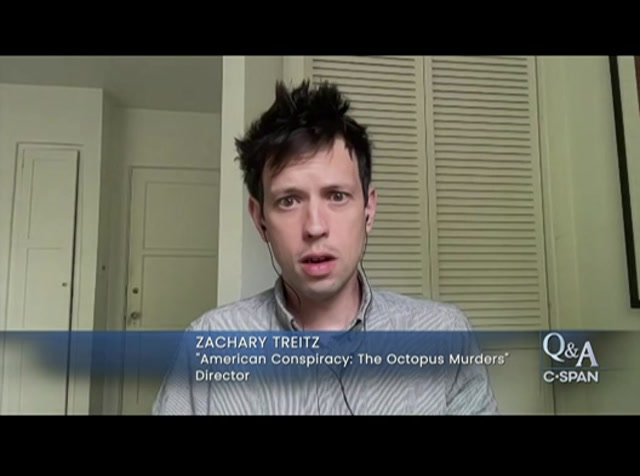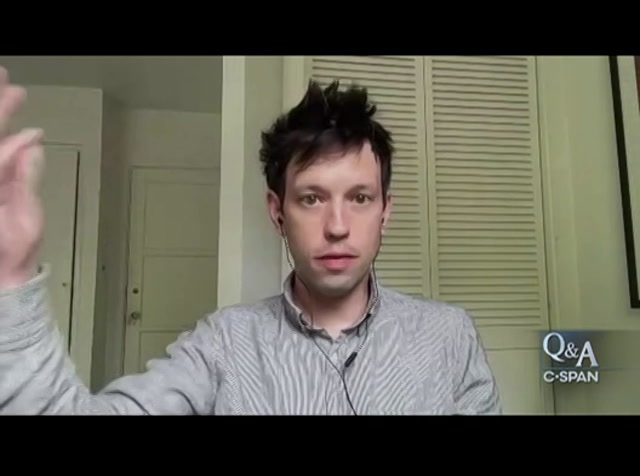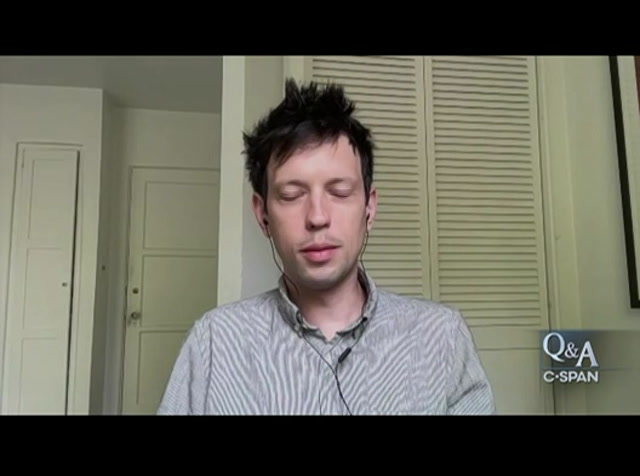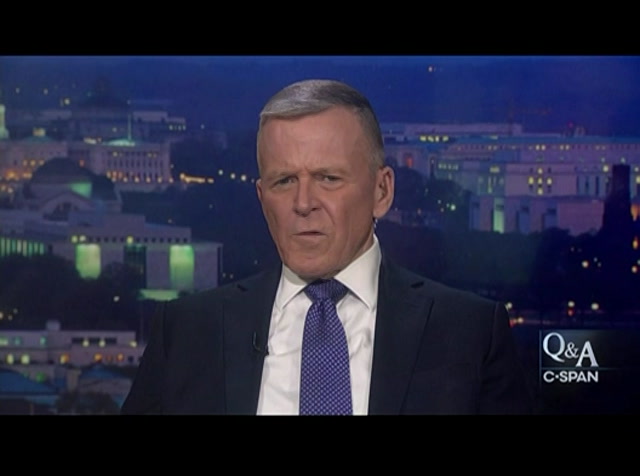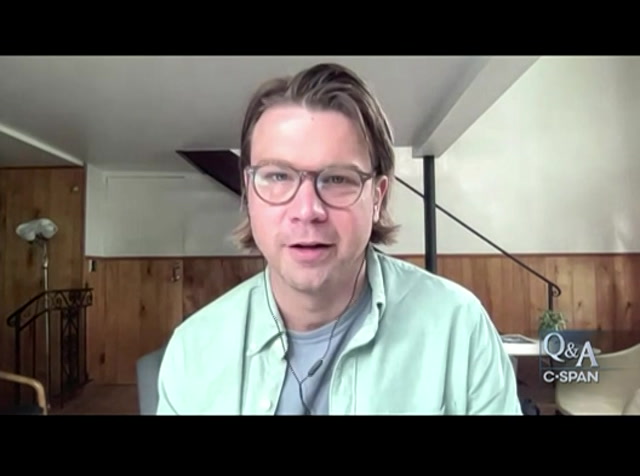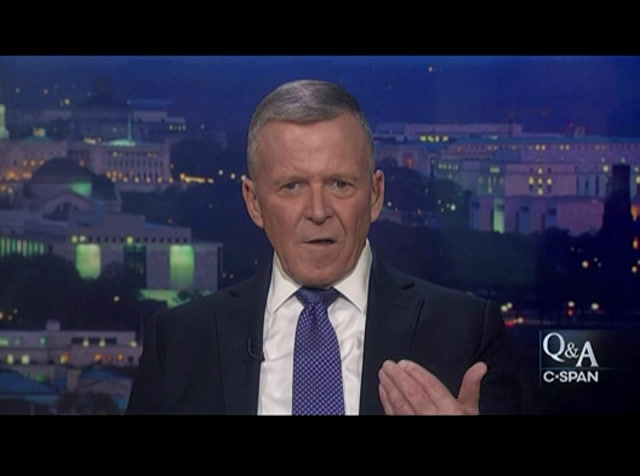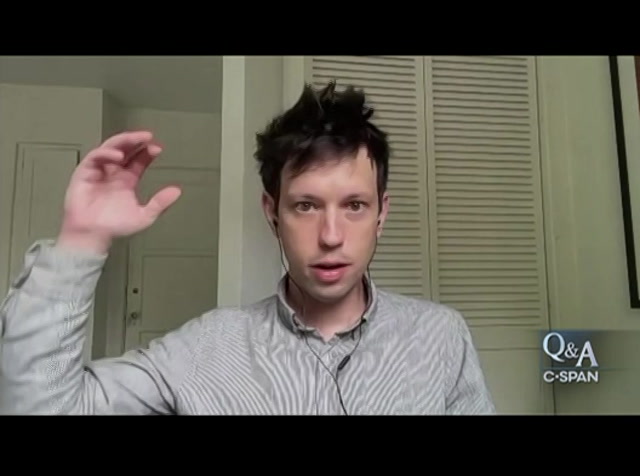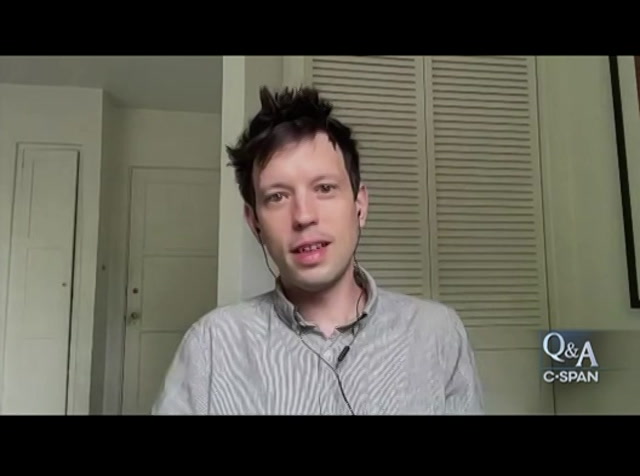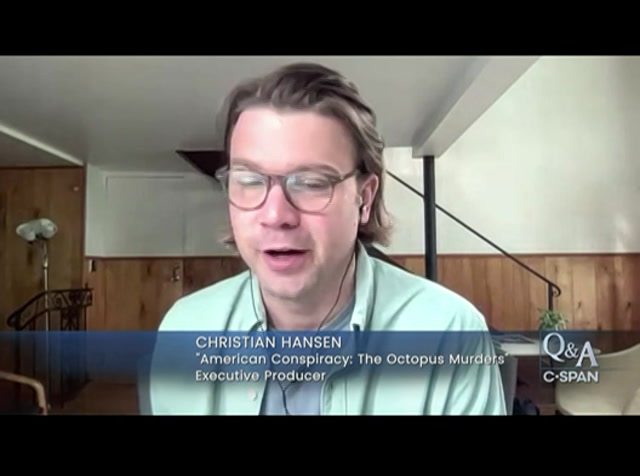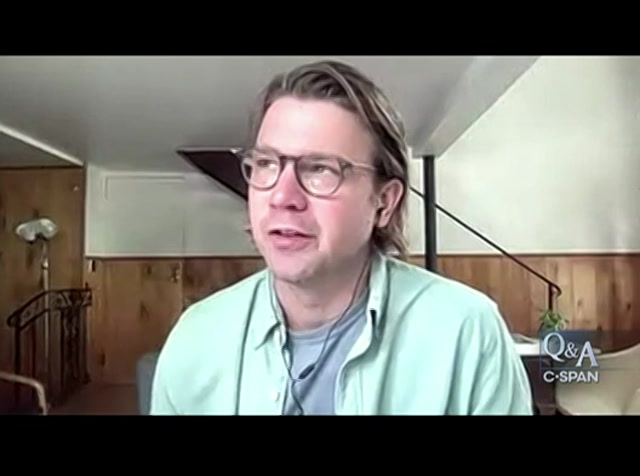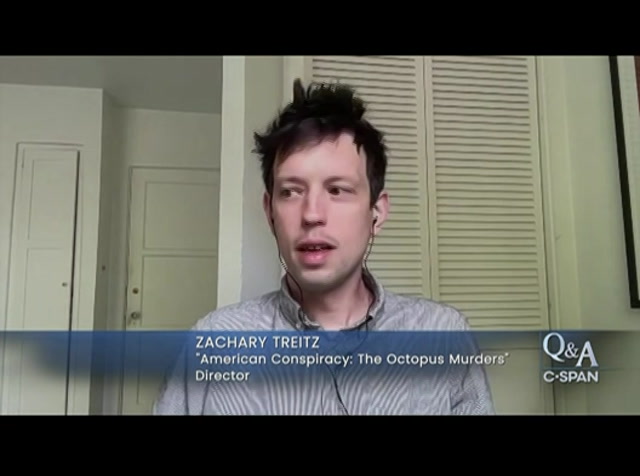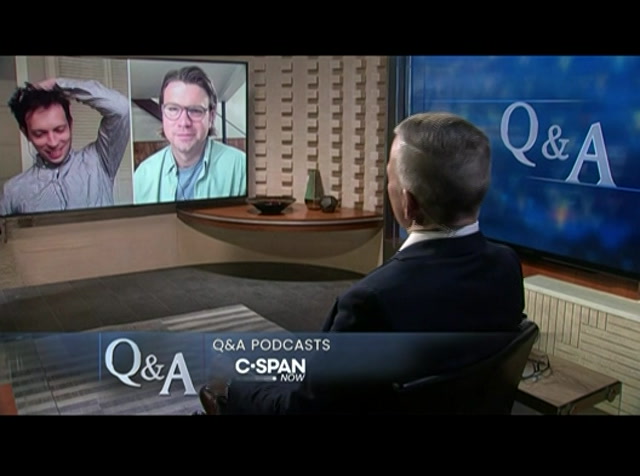tv QA Filmmakers Zachary Treitz and Christian Hansen on the Mysterious Death... CSPAN April 22, 2024 5:57am-6:59am EDT
5:58 am
these other television providers, giving you a front row seat to democracy. ♪ >> reporter danny casolaro was found dead over the weekend at a hotel in west virginia. authorities quickly ruled his death a suicide. >> it did not sit right in my mind. i am thinking they killed him. ♪ >> the book that danny was
5:59 am
writing, he started looking into these powerful people and realizes there is something much bigger going on. >> these eight men are no longer government officials, but their tentacles can reach into almost any part of government and almost any country. i have come to call this group the octopus. >> we do not know what you are talking about. it is beyond what a couple of local detectives can do. >> it all started with the software. >> these programs allegedly allowed the cia [indiscernible] >> the two of them transferred in excess of $40 million. this money was used to buy off -- >> it was a disturbing conspiracy. host: the octopus murders, this
6:00 am
is a pretty complicated story. how do you tell it in a nutshell? guest: if i am in an elevator that is moving very quickly, i would say that it is a murder mystery thriller documentary that centers on the life of the research of a reporter from d.c. named danny casolaro. host: how did you find him? guest: i was studying the private prison industry, and i started looking into the history of a company, which had the first private prison in america, but it also had a huge multinational security concern, and i started digging into the company and learned about edit secure -- an obscure plan to
6:01 am
manufacture biological and chemical weapons and night vision goggles and machine guns on a native american reservation in the coach altobelli, and that danny casolaro got folded into that research because he was looking into that operation as well as part of a larger book project he was working on in the last year of his life at the end of which he died mysteriously. host: how long have you been working on "the octopus m urders." guest: i started in 2012. host: and when did you finish? guest: the movie came out on netflix just a month ago. i am still researching it. i guess i have not quit. host: you are about 12 years into this at this point. would you consider it an obsession? guest: yes, but i also think
6:02 am
other people have a negative connotation to the word obsession. deep interest -- i do not know, i will take obsession. host: zachary treitz, how did you get involved in this? guest: i am christian's friend basically, and my background is more independent film, fictional film, and christian started telling me about this probably back in 2012, 2013, and i was just his body. he would tell me some of the people he was looking into and organizations and told me about danny, and i was just a sounding board for years, and then in 2017 we took a trip to pick up one of danny casolaro's main sources are present who had been
6:03 am
there for 26 years. we filmed that trip and that was not intended to be anything. we had no designed to make a documentary, but we knew it was a big moment for christian and the story, so as a filmmaker i had to film it. often on i guess since 2017, and it picked up steam a couple of years ago when we decided to make this netflix series. host: the trailer we saw at the beginning of this program said that you also produced a series called "wild wild country." what is that? guest: that is our producer, they directed it. so that whole group that made "wild wild country," they took us on is their next project. our shepherds.
6:04 am
host: christian hansen, zachary treitz, what is danny casolaro's background? guest: danny casolaro was born in mclean, virginia. his father was an obstetrician, delivered a lot of d.c. and virginia babies, and danny was a writer. he actually kind of went to back it up for the between journalism and poetry and fiction in the early 1970's. he had investigated the watergate case. i found evidence of that in the fbi files that they were tracking his watergate investigation, and then throughout the late 1970's and 1980's danny wrote about the computer indtry for a small pc-based nslter called computer age, which if you think
6:05 am
back to the late 1970's and early 1980's, writing about computers was pretty obscure. the computer industry was small and highly technical, and there were no personal computers really to speak of. these were like huge computers. anyway, danny published this newsletter. it was not necessarily something he was insanely passionate about. she had a child when he was about 21, so i think it was a stable source of income for him, and he wrote about computers, and he really dug into it, then he sold the publication in about 1990, and started pitching ideas, more interesting, more complex stories, and a basically
6:06 am
a former colleague from his computer publication came along and said, "hey, i've got this crazy lawsuit, the software company is suing the doj. i think you look into this." host: let's show some more video from the netflix series "american conspiracy: the octopus murders." >> in order to figure out what happened to danny, i wanted to see what he was seeing, then i realized i should just finish the book that danny was writing. >> [indiscernible] i am scared, you know. >> it all sounded a little weird to me. it was christian, my friend
6:07 am
christian. was this guy really about to expose the most dangerous political conspiracy of the century? had already -- or had he fallen into some kind of paranoid fantasy? so i went along with him as he tried to finish what danny casolaro started. and we uncovered the secrets of the octopus. >> [indiscernible] >> this is not your thing. you don't know this world. >> hey, christian. what is the deal? >> he said i can come out to his property. i cannot bring my phone, and i have to be blindfolded on the way out there. host: zachary treitz, you
6:08 am
sounded a little skeptical when this started. guest: yeah, maybe that is my role in christian's life. the beginning of this story was a little bit of a wet blanket, just because a lot of the stuff that danny was looking into and that christian at the time was looking into was so hard to pin down, seems very mysterious, and seems a little -- i don't know whether these people were great sources or not. a lot of people in this world seemed pretty dangerous, so i was worried for christian and i was worried about his own grasp of reality, because as you see it gets pretty psychedelic and pretty mind altering and terms of the things that danny was looking into, the people, the
6:09 am
organizations, the intelligence community related things and criminal community related things that were looking into. host: at what point, zachary treitz, did you search for financing for this? guest: we are still searching, no. when we pitched it to our producers in 2018, 2019, and they were the first people that just seemed to grasp exactly what we were doing, so they helped us develop a pitch, and we pitched it to netflix. it was the only pitch we did. host: as far as netflix viewership, how is it been doing? guest: it is done pretty well. millions of people watched it.
6:10 am
it was on the top 10 for a couple of weeks at least. it was the number two show on their platform in the united states. i think it was number four worldwide, which i think for a humble operation like we are running pretty good. host: christian hansen, and that less video we saw there was a basement setting with lots of boxes. where was that? guest: a good friend from kentucky owns a duplex and said as long as i was writing and researching on the book back in the early stages, i could work in his lower empty apartment. he lived in the upper two floors and had an empty furnished floor , so i moved in there and just wrote all the time. another friend who was a
6:11 am
songwriter said if christian can have a residency here i can have a residency here too. he got annoyed. that was not part of my process at that point, so i was annoyed, and i had set up an office down at the workbench in this dank basement, and that day and photographer friend from d.c., he was in town. we both went to the kentucky derby, and that is why i am wearing a suit. i said you should come photograph my weird workspace and look at this letter, so that is the story behind that photo. host: what were you doing in 2012 when you began this project? guest: i had lived in new york for about three years, and i was photographing for the new york times, and then my younger
6:12 am
sister got cancer, and i went back to kentucky to be near her. she does find out, and i had dropped out of college, so while i was back i went ahead and took my last few classes to get a degree, and it was in one of those classes i was researching the private prison industry, and that is pretty much referring back to my earlier answer, that is how that came about. host: zachary, you wanted to say something? guest: i was just going to -- i think we might've been talking about two different basements in that thing. i did not think he was talking about the boxes we found on the west coast, but whatever. host: we have not gotten there yet. we are still at the beginning stages of this. so august 10, 1991, let us look
6:13 am
at some more video. >> they called me on walkie-talkie and they said we need you. what do i need to bring? they said your courage. and that is what i walked in and saw what i saw. it was just a mess for lack of a better explanation. it was messy. there were blood handprints all over the world -- wall and smeared all over the wallpaper and the countertops, just blood everywhere. the housekeepers told me there were not sure if there was someone in the tub or not and i was peeking around the edge to see if there was a body here,
6:14 am
and i could see the tub was full of blood. i do not want to look around that corner, there was just something spooky about it. so i decided to peek through here. and at that point i said there was someone in there. something very wrong had taken place in here. ♪ host: zachary treitz, what were we just watching? guest: that was the -- one of the maintenance workers at the sheraton hotel describing what he found on august 10, 1991 at the vetheraton in martinsburg.
6:15 am
she had been called up because a maid had found some blood on the floor, and we met him. we knew his name i think from some police reports or something, so we sought him out and convinced him on that day and asked if it would be ok for him to just explain the basis of what he had seen that day, and i think he was reluctant to do that at first. it was obviously a pretty traumatic day in his life, it also martinsburg is a pretty small town. he agreed at the last minute and took us through. guest: he was reluctant, but he was like we do not want your opinions. we just want to know what you saw, and that is what persuaded him. he cannot argue with that.
6:16 am
host: just to be clear, danny casolaro was found in the bathtub full of blood, correct? guest: yes. host: did you have to rent the room to get all of that footage? how did you get the hotel to agree to all of this? guest: i believe we rented the room and the adjoining room to keep all of our boxes into gear in. host: was danny casolaro's death a suicide or murder? what was the official report at that time? guest: the official report from the martinsburg lease -- police was that danny casolaro committed suicide, and the fbi and to get jay did review of the findings, and officially upheld the suicide findings.
6:17 am
host: did you have trouble getting people in martinsburg to talk besides the maintenance worker? guest: i had a lot of trouble getting the police chief who was the chief investigator to talk. host: why do you think that was? guest: he said it would not be proper to discuss a closed case. i do not agree with that. i talked to police about old close cases of the time and they usually like talking about their history, and they are allowed to. host: was there fbi involvement in this case it is point? guest: at this point, yes and no. denny was talking to an fbi agent in los angeles about organized crime and talking to another fbi agent in the d.c.
6:18 am
area who is kind of a white-collar crime specialist, then he supposedly was going to meet with two fbi agents from lexington kentucky on that trip in which he died. we got the name of one of those agents, but he had passed and his wife was not able or willing to help us, so there was some fbi involvement-ish as far as people any was talking to -- danny was talking to. host: why did danny casolaro call this the octopus? where did that name came from? guest: danny was at the phase that he was preaching his book idea, so that is where you boil
6:19 am
down your concept to about a six page enticing synopsis of the story you are writing enter with the characters and why would the publisher want to give you in advance to actually finish the book? so there is a certain level of hype in that style of writing, you know. it was called the octopus because she starts looking into one d.c. area 1980 scandal, and that takes him over into the iran-contra scandal and the october surprise and bci and the same kind of players, nefarious
6:20 am
players, their names are popping up here and there and there, so it seems like it is part of an interconnected, more like a web, but the octopus is such a good literary image i guess he went with that. host: we are talking about ronald reagan and george h.w. bush in the mafia and the cia, fbi, iran contra, all of these famous issues we have had throughout our history. zachary treitz, at what point did you ever think we are in over our heads here? what are we doing? guest: i think pretty much from day one we were in over our heads and kind of acknowledge that. when christian -- when we were first talking about some kind of project together, question asked me what about the octopus?
6:21 am
what if we did that is a documentary? and i said it is just too hard. it cannot be done. i don't know, you might remember that better than me. guest: zach was looking for his next project. i was stuck. i had been working on this thing self-funded by myself for several years i think, and we were at half-court on the tennis court, we play tennis together and we were trying to figure out what we were going to do next and what zach was going to do next, and a few ideas he and i had separate to this, and zach seemed discouraged, and i was like what about the octopus? he sighed and really emphatically said it was too hard, and he had already started
6:22 am
writing this pitch and doing the initial steps of reproduction, so i guess at some point she decided it could be done and saw a path forward. guest: what is difficult about this story is that we were essentially researching while we are trying to tell the story, which is always hard. traditionally do your research, find out what is going on, and complete your book or whatever you are doing, so christian was researching, and i jumped into that as well until essentially the end of the project. we never stop to because there are a limitless number of things to find out in this story, so that makes it really difficult. the complexity of the story it makes it really difficult, a number of names, and the access
6:23 am
makes it really hard, because it is a story not only about people and events that happened 30, 40 years ago, and a lot of those people have since passed away including our main character, danny, so there were just a lot of obstacles to being able to find out what happened and being able to tell the story of what happened. guest: christian hansen, you were acting as danny casolaro throughout the series whenever we would see reenactments, correct? guest: that is true. i think that might be the first time that is been done in a documentary, but i could be wrong. guest: it was not just a vanity project, that choice.
6:24 am
that choice came from christian talking to danny's family and friends, and when i was there it just kept coming up over and over again. they would look at christian like they had seen a ghost because you look so similar to danny. it is strange being here with you because you look so much like danny, and christian is trying to follow in danny's footsteps, so when that happened i guess as a filmmaker you don't just let that opportunity go. christian even took acting classes, and we tried to do it right in pushing forward so that it would not feel strange or too hokey. host: denny's brother tony participated. >> danny and i stood in our
6:25 am
kitchen and talked for a long time about what was going on. he did not tell me a lot of the details, except that it was a vast, disturbing conspiracy, and in this whole world he had been looking into, some of the same people kept appearing. ♪ i do not know why martinsburg, but apparently danny was to post to -- was supposed to meet with the source in west virginia, but i cannot tell you who he was meeting with. i just do not know the answer. he told me he was getting funny phone calls and some threats, and he said to me, by the way, if an accident happens it is not
6:26 am
an accident. host: was the family eager to participate in this, to have this exposed? guest: the family has been approached by researchers ever since it happened, and the last interview that they gave, danny's best friend and brother was in 1993 for unsolved mysteries, and that was it until we came along, and we were able to gain their trust, and i think at that point they did want to have some finality. things were kind of left up in the air with unsolved mysteries, and we did our best to bring
6:27 am
more closure to this very deeply said and really kind of psychically confusing case. host: this is a -- did you two change in the 12 years he will been working on this? do you feel that you changed at all? guest: i do, i think i do, but i also try to stay positive and joyful, but yeah, i am definitely curious, but i also know how long it takes to do an investigation of something really complex, which is now something that i find that i love to do, so i kind of feel like i do not know anything until i have really dug into it. host: you mentioned former msnbc
6:28 am
producer ann clenk. who else should we know about who helped you along this path? guest: zach, what -- guest: there is an almost infinite number of people, because the story just to give you a quick overview, we started in d.c., well, we started in martinsburg and talked about danny's final days and we talked about the computer software scandal he was working on, and we head out to the west coast of southern california into native american reservation where a company was developing weapons and military equipment on this reservation, and there is a triple homicide there, and then
6:29 am
we went to san francisco and there is a very scary, mysterious homicide that happened to one of our business partners all connected to this west coast group of very brilliant, very scary in my mind people, and then you expand outward internationally with the things danny was looking into in terms of arms deals, drug deals, covert action and stuff like that. political scandals around the world. every single person he interviewed obviously. guest: we talked to hundreds of people who did not sit on camera just for background information and clarity, or they know someone who knows someone and
6:30 am
maybe one of those people appears in the film. host: one of the people you talk too often and to does appear in video is bill hamilton. here is a little bit of his story the series. >> she started sending me thousands of emails. he is giving me leads, he is giving me documents to corroborate these things. he would send me something else and something else. it was an unbelievable time in my life. i was fully dedicated to the story, and i had the source who was too. pretty early on in my talks with bill, he points out there was this archive at the university of missouri where all or many of danny's notes are stached, so i went there and copied all of it.
6:31 am
it took five days. so these are some of danny's handwritten notes, but i have learned to really be able to read his handwriting. phone numbers, arrows, names, corporations. the archive was thousands of pages of research material. i realize that it was basically a blueprint of the book that he was writing, and it was abouta f series of international related crime starting with the inslaw case. host: what was the case into isabel hamilton? guest: how many hours do you have? guest: bill hamilton is a former nsa something -- i don't know,
6:32 am
employee who found an organization called the institution for law and research, and their main product was a software program in the early days of computing to take paper files of a prosecutor's office and digitize them into a database where the information could be referenced and cross-referenced and broken down and analyzed and you can find trends and patterns, stuff that would have been impossible with filing cabinets. and then eventually the database could be connected to the u.s. attorney's office in nashville, and there could be connectivity,
6:33 am
and so basically the reason why we are talking about this company today is because there was this contract dispute between the department of justice, who was contracting with the software, and it led to an eight years long legal battle and led to bill coming up with the sources who were telling him that the software was stolen as part of a -- and by the way, two courts ruled that the justice department sold the software using trickery, fraud, and deceit, but it was unclear why, and when he began to believe was that it was part of a international espionage
6:34 am
operation where the software was distributed to other law enforcement and intelligence agencies around the world with the secret back door and it sold through third parties. what seemed like normal software distributors, so that is the case. host: how did bill hamilton get in touch with danny casolaro? >> they had a mutual friend, a guy named terry miller. she was a computer contract expert and consultant. he would consult on ibm contracts and huge computer contracts, and he wrote about what is happening in the world of government software procurement, and he knew danny was a tenacious reporter, and
6:35 am
bill hamilton was at that stage where she had two court ruling saying the department of justice told the software and she was at a point where she needed to figure out why, and collaborating with a investigative reporter who has their own interest in mind is like free legal investigative work i think. that is what will -- bill wanted. host: this is the early mid 1980's and is pretty cutting edge software this point, correct? guest: correct. host: why were danny casolaro's papers at the university of missouri? guest: there is an organization for investigative reporters called investigative reporters and editors, and after a reporter in arizona was murdered in a car bombing that was
6:36 am
connected to reporting he was doing on organized crime in phoenix, i think, and so basically a consortium of journalists descended on arizona to basically finish is reporting -- his reporting, and his organization was started to support investigative reporters. it is housed at the university of missouri in columbia, which is the oldest journalism school in the u.s. initially danny's papers were sent to the ire, but it is kind of a small, ragtag organization. i think their funding comes from numbers, it is $80 a year to become a member. the missouri society has a really nice archive facility, so they took over danny's files, so
6:37 am
they are just kind of randomly into missouri. host: zachary treitz, do you consider bill hamilton a reliable source? guest: putting me on the spot here. i think that bill in my mind was a very well-meaning person as far as i could tell who wanted answers to a very complicated, difficult to discern story of what happened to ms. software and what had happened to his company, which went bankrupt trying to fight the justice department essentially, so when he was talking to christian over the years, i do not know how you could keep up the volume of
6:38 am
communication that bill did, thousands of emails, tons of calls to christian without sincerely trying to find out what happened. as far as his ultimate reliability, that sort of comes into question in the movie, and we grapple with that, and i do not know that i have too much more to say about it other than what we put in their. i tried to give everyone the benefit of the doubt, and it is an extremely complicated story and it is easy to get lost within the maze of this into not know what is real and what is not, so that is a complicated answer to a very complicated question. host: gentlemen, there is another person who appears prominently, michael.
6:39 am
who is he? guest: michael is a child prodigy from the pacific northwest. he ended up going to in elite school and he studied at 16 under someone who later won the nobel prize for laser research, which michael was deeply involved in. and then michael ends up, and this is in the early and mid-1960's michael ends up in the echevarria scene -- ashbury scene in san francisco. he ends up arrested in 1972 in seattle for manufacturing lst and pcp in an underwater lab or
6:40 am
a lab that you have to go underwater to access. he went to prison. he had this very colorful life. he has a very complicated character and is hard to sum up, but he was ultimately out on that reservation in the coach altobelli and was working on some weapons research projects. and later told bill hamilton that he had on that reservation installed the back door into the software and ultimately became a source for danny, and he told danny about his involvement and life, it is very colorful, very bizarre life. several months into them being a source for danny, michael was
6:41 am
arrested on federal judge -- drug charges and served 26 years in prison. host: to the audience who is not seen the "american conspiracy: the octopus murders," i apologize. this is not an easy story to tell, but we will show you more video with the producers of was provided to us. this is john powers. ♪ >> in november 2007 i was told by my sergeant that i would getting a cold case to look into , and it was a 1991 triple murder, sometimes referred to as one of the tentacles of the octopus murders. i investigated it, i solved it.
6:42 am
i arrested the person who was responsible, and nine months later they let him go. and still to this day it is a mystery why they let him go. host: christian hansen, what to be talking about here and how did we end up in the desert of southern california? guest: we are talking about -- so, michael told bill hamilton and danny that the software was modified on this reservation, and that is where a back door was installed into it. it was later disseminated to canada. by following the software that is how you get there, but this is the first native american to
6:43 am
see it in the united states. so much information, it is one of our great regrets, but the indian gaming act came from the supreme court case between a band of indians and ultimately their casino and the state of california, so that is why we are in that area, and then you have the founder or this enigmatic character named john philip nichols did you meet an episode 2. he was basically sort of a cia contractor as far as we can tell you had a penchant for hiring murderers, and one of the travel members and two of his friends
6:44 am
were killed in a still unsolved triple homicide. they struggled under witness questioning, a lot of what john philip nichols was up to and accused him of skimming money from the casino, so john powers years later in about 2010, he was a cold case detective and riverside county, in this case popped up and got deep into it and ended up arresting someone he believed was responsible for the triple homicide. that guy ended up getting let go, and to is back in central america where he had moved. host: now there is a connection to iran contra and weapons training, and this is on the reservation, a 26 member indian
6:45 am
tribe. here is some more video. >> this is just a bizarre cast of characters who gets together. you have people from the military and the cia. you have michael and earl brian, a businessman and close confidant to president reagan. earl denied he had anything to do with bringing the software out to that reservation, and get these records showed michael and earl brian together in a demonstration of weapons. and there was also two contra generals from nicaragua out there. they had automatic weapons, machine guns, semi automatic
6:46 am
weapons, and night vision goggles. [gunshot] >> nichols wanted to manufacture weapons for these contra generals, but why? why there? it is a small tribe of 26 people. this was a time when the u.s. government was providing weapons in secret for countries in central america. host: zachary treitz, we have introduced a new character, earl brian. who is he? guest: earl brian was a guy -- it is like all of our characters. earl brian was a neurosurgeon trained as a doctor who about two years after she finished
6:47 am
medical school and over to vietnam for a few years, came back slightly decorated, and was a member of governor reagan's california administration and the program there and became in charge of that. later on, he was a guy who -- i think he ran for office and was not successful and went into business. he eventually actually owned a tv company called the financial news network, which later became cnbc, which and clank -- ann clenk worked at, and t owned upi , and other companies. he also owns a company that was competing with inslaw, which
6:48 am
bill hamilton alleged that the president of that company went over brian's head and said they would find a way to steal the software, procure the software from bill hamilton, and then later on -- i guess he was a friend of reagan. the kitchen cabinet of ronald reagan when he was president. he also shows up on a police report saying that he was out at the coachella at this weapons demonstration, and then later on she went to prison for fraud as a lot of characters in our history -- in our story went to prison. he was indicted for financial manipulations related to his
6:49 am
company, inflating the value of those companies. very complicated character. he kind of was a bad guy in bill hamilton's mind, and danny casolaro wanted to interview him, wanted to talk to him and did talk to them i a family picnic that ann clenk invited them to, and danny's friend worked at the news network and they played a game of volleyball together when danny was trying to use that as a way of interviewing him, but brian seemingly large and unfit just totally schooled danny at volleyball. host: is this a follow the money
6:50 am
story, christian hansen? guest: follow the money, it a software, and follow the unsolved murders i would say. host: is it a conspiracy? guest: yeah, i think so. it is a word for it. a very loaded and charge word for sure. host: it is, but go ahead and explain what you say that? guest: for instance, these -- there is a murder in episode 3 in san francisco, and that is a very classic which is today unsolved, but i make a really good case of what happened and why in the film. you have john philip nichols and michael's dad basically planning
6:51 am
the murder and a restaurant about a block from his house. two or more people planning a crime is a conspiracy, and we also know about how much money the killer was getting paid. he was on retainer from michael's father, and i don't know -- it is very confusing, but also if the software was released stolen and half of the stuff people are saying is true with regard to what happened to it, if it was stolen and covered up that would be a conspiracy, but then again with danny casolaro there is a lot of stuff with his death that looks like a cover-up but can be easily explained away as shoddy police work. host: in the opening video, you
6:52 am
ask on camera whether or not christian is about to expose the biggest conspiracy of all time or if this is a paranoia. what if you concluded after 12 years working on this? guest: there is conspiracy and then there is conspiracy theory, which is an important line to draw. and i think danny's story at the time christian was researching it if it lived at all in the popular imagination, and it really only lived on the internet and people who remember the unsolved mysteries episode as a conspiracy theory, danny's death is seen as one conspiracy to rule them all. that all of these people are
6:53 am
connected in the intelligence world, and all these political scandals, iran-contra, all of these things are one big conspiracy or conspiracy theory. so i think that what i have discovered is the word conspiracy theory, which is kind of a bad word in many people's mind in these days especially in recent history, which we do not touch on. because of that word to being a way that you can dismiss people as being lunatics or unhinged or way word in their thought process, it is a good way to dismiss what danny casolaro was working on. what i discovered and what we discovered was that no matter
6:54 am
what happened to danny, danny was on and unbelievably rich story filled with con artist and liars and criminals, but also those people did have real connections to the intelligence community and that danny was on to an amazing story. what has been proven by us telling his story is an amazing story. just because people are watching it and mostly enjoyed it. i get a little bit frustrated when he gets lumped in with this is just a conspiracy theory. a lot of this stuff was once considered a conspiracy theory, and then turned out to be true. it is not as simple as saying, oh, these things just because we will never know what happened is
6:55 am
just a conspiracy theory, do not worry about it. host: christian hansen, are you still investigating? guest: yes, you see when we pull out and showed this lgemap of connections and the way we have it structured with tentacles, basically to me all of those tentacles are great films, great stories, and people also sense of the show as come out that kind of have fascinating first-hand experiences with different aspects of the story that we present and the larger story and news stories have come forward and message me on twitter and instagram, and they found my email, so a simple answer, yes.
6:56 am
but i am also taking a little break, but cannot wait to get back into it full-time again. host: there is an online community now regarding the octopus murders, talking about danny casolaro and some of the people you feature in this. do you ever check those out? guest: i do not. raddit -- reddit is probably the place where it is really happening, but i have just been lost in my own research, and i tapped into those communities, but they are mostly discussing materials that i put on the internet in 2015. i put a lot of material, me and another researcher. i gave it to emma, and she put it on archive.org. there are thousands of pages concerning some of the cases on
6:57 am
their, so i am familiar with the material that they are discussing, and that i have got step that they do not have. >> are you checking in with the internet community? >> not really. but it is interesting that people before the show came out, people would be discussing the case or find out christians name and look at denny's files and not realize they have any's files because they were on archive.org. submission is the johnny appleseed, taking it back to 2015. host: i apologize if we have
6:58 am
9 Views
IN COLLECTIONS
CSPAN Television Archive
Television Archive  Television Archive News Search Service
Television Archive News Search Service 
Uploaded by TV Archive on

 Live Music Archive
Live Music Archive Librivox Free Audio
Librivox Free Audio Metropolitan Museum
Metropolitan Museum Cleveland Museum of Art
Cleveland Museum of Art Internet Arcade
Internet Arcade Console Living Room
Console Living Room Books to Borrow
Books to Borrow Open Library
Open Library TV News
TV News Understanding 9/11
Understanding 9/11